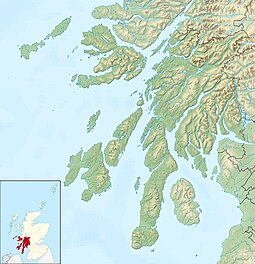}}
| Old Norse name | Flat-ey |
|---|---|
| Meaning of name | "flat island" |
 Fladda seen from the north-east | |
| Location | |
| OS grid reference | NM298438 |
| Coordinates | 56°31′N 6°23′W / 56.51°N 6.39°W |
| Physical geography | |
| Island group | Treshnish Isles |
| Area | 26 ha[1] |
| Highest elevation | 26 m |
| Administration | |
| Council area | Argyll and Bute |
| Country | Scotland |
| Sovereign state | United Kingdom |
| Demographics | |
| Population | 0 |
| References | [2][3][4][5] |
Fladda is the northernmost of the Treshnish Isles. Its name comes from the Old Norse Flat-ey meaning "flat island". Fladda is owned by the Hebridean Trust.
Archaeology
editFladda's archaeology is recorded by the Royal Commission on the Ancient and Historical Monuments of Scotland. It refers to a building and mounds which may be the site of an early Christian chapel and burial ground.[6] It notes the similarity to finds on Colonsay.
In Literature
editFladda is mentioned in Frank Fraser Darling's book Island Years. He lived on the neighbouring island of Lunga with his wife and son while carrying out research. Darling notes that Fladda was the site of the summer home of the Robertsons, who at that time had been fishing lobsters around the Treshnish Isles for three generations.[7]
Footnotes
edit- ^ Rick Livingstone’s Tables of the Islands of Scotland (pdf) Argyll Yacht Charters. Retrieved 12 Dec 2011.
- ^ National Records of Scotland (15 August 2013). "Appendix 2: Population and households on Scotland's Inhabited Islands" (PDF). Statistical Bulletin: 2011 Census: First Results on Population and Household Estimates for Scotland Release 1C (Part Two) (PDF) (Report). SG/2013/126. Retrieved 14 August 2020.
- ^ Haswell-Smith, Hamish (2004). The Scottish Islands. Edinburgh: Canongate. ISBN 1-84195-454-3.
- ^ Ordnance Survey. OS Maps Online (Map). 1:25,000. Leisure.
- ^ Mac an Tàilleir, Iain (2003) Ainmean-àite/Placenames. (pdf) Pàrlamaid na h-Alba. Retrieved 26 August 2012.
- ^ "Site Record for Treshnish Islands". CANMORE. Retrieved 12 August 2012.
- ^ Darling, Frank Fraser (1940). Island Years. G. Bell & Sons.
56°30′30″N 6°23′35″W / 56.50833°N 6.39306°W
